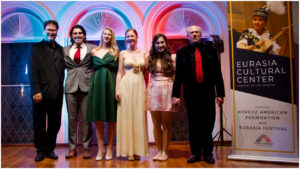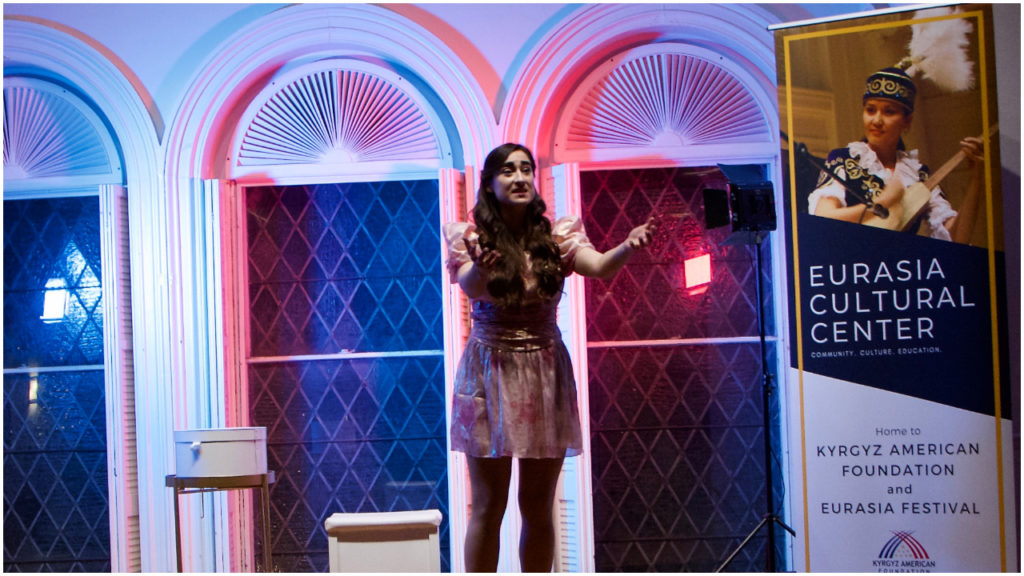
Park Avenue Concert Series 2019 Review: Frederick Schlick, Mariana Barbosa, Natalia Strzelecka, & Amelia Burshe
By Logan MartellOn December 21, 2019, the Eurasia Festival presented the second concert of its Park Avenue Concert Series. Held at the organization’s new location of the Eurasia Cultural Center, this series gives performance opportunities to students of the “Azatt Sessions,” a series of classes taught by director Mark Verzatt and Eurasia Festival President and pianist, Aza Sydykov.
A Tenor Opens
Opening the concert was Verzatt, who introduced each of the evening’s singers and provided context for their musical selections. First up was tenor Frederick Schlick, singing “Ich baue ganz” from Mozart’s “Die Entfuhrung aus dem Serail.” Through the introduction, Schlick bore an uncertain, vulnerable expression which he stilled with his measured breaths before his warm opening phrases. His repetitions through the text saw him mustering his courage, reaching an emboldened vocal strength which powerfully dyed his ornaments and leaps. By the end of the number, Schlick had tangibly traced the arc of Belmonte’s inner state, bringing it to a wonderful close.
The second aria from Schlick was “A te, o cara” from Bellini’s “Puritani.” The softer, romantic sentiments of the accompaniment were joined by the firm height of Schlick’s opening phrases, featuring brief leaps of ornamented ardor. This tender power allowed him to leap to a high C with a captivating ease.
His third aria was the famous tenor showcase “La Donne e Mobile” from Verdi’s “Rigoletto.” Through the lively introduction, Schlick carried a thoughtful expression as he mused on the opposite sex, his opening phrases coming as a lighthearted answer to the Duke’s romantic troubles. Despite this cheerful veneer, Schlick also bore slightly-bitter nuance which nicely added to his lines. All these layers colored his diminuendos and brought an invigorating strength to his conclusion.
Musical Theatre
Soprano Mariana Barbosa’s selections played to her strengths in musical theatre. Her first number was “By the River” from Maury Yeston’s song cycle “December Songs.” Described by Verzatt as “a melancholic evocation of nature,” the song’s rapidly circling accompaniment nicely established the feel of flowing water as Barbosa opened with soft, charming tones that transitioned towards a heightened, almost-desperate passion for the chorus. A dissonant flurry saw her kneels as her emotions flowed back to reset the musical atmosphere, swelling back again towards a higher texture which she navigated beautifully.
Her second number was “The Glamorous Life,” from the film adaptation of Stephen Sondheim’s “A Little Night Music.” With a pouty opening, Barbosa established the youthful qualities of Fredricka through the phrases of dull domestic life, her dreamy, sustained tones as she pulled out a letter from her mother were highlighted by the accompaniment’s brighter colors. This highly-taken quality saw Barbosa explore a world of exciting possibilities as she spoke of her mother’s career and accomplishments with blossoming affection. Her mother’s absence in her life, and the desire to see her, lent a lovely conflict which was clear on Barbosa’s face. As these hopes and thoughts shifted into fantasy, her energy took her voice to a more operatic height for an exuberant finish.
The last number of the night saw Barbosa perform the coloratura showcase “Glitter and be Gay” from Bernstein’s “Candide.” Wasting no time, she dragged herself onstage through the languid waltz measures of the accompaniment, with Barbosa employing a fearful lower register and a pained physical bearing. Her descending cry of anguish soon led to bouncy phrases of her fabulous wealth as she pulled earring and trinkets from a box onstage. This false sense of well-being that she displayed through her section of sparkling coloratura collapsed with a grieving quality from Barbosa as the piece returned to its earlier rhythm, with her spoken measures bearing a self-directed sharpness. As the tempos picked back up, her loss of self-identity saw her reach manic heights, strongly captured with the scornful phrase “If I’m not pure at least my jewels are!” While her final section of coloratura was more modest in comparison to well-known renditions of this aria, Barbosa did not lack for quality or sheer dramatic fervor as she brought it to a tremendous conclusion.

Two Sopranos
Following this was soprano Natalia Strzelecka, singing “Dunka Zuzi” from Stanislaw Moniuszko’s “Verbum nobile.” A famous Polish composer, Moniuszko’s work strove to capture the national spirit of his country, with an emphasis on the cadence of the language. Strzelecka displayed a gorgeous, refined soprano through the sorrowful text and lingering chords of the accompaniment. The next section carried a somber yet lively mazurka rhythm that built with Strzelecka’s touching phrases.
Her second number was “Kornblumen, op. 22 no. 1” by Richard Strauss. This briefer number saw Strzelecka utilize a more passionate vocality which nicely contrasted with the more measured accompaniment as she outlined the invocative phrases which bestowed an abundance of meaning upon the titular flowers. Her lower, sustaining tones also showed her ability to slow the moment and draw out great dramatic significance.
Strzelecka’s last aria was “Giunse alfin… Deh vieni,” from “La Nozze di Figaro.” With Verzatt explaining the pre-revolution undertones of the opera, we see the stakes of Susanna deceiving her master as Strzelecka built up her courage through the recitative, taking up the andante rhythm of the aria with a beautiful lyricism. This sonorous quality was finely captured by her rising duplet phrase “ti vola in coronar,” which gracefully built to a softly-sustained F natural before bringing the number to a peaceful and lovely close.
The next artist was soprano Amelia Burshe, singing “Or sai chi l’onore” from Mozart’s “Don Giovanni.” Jumping into the drama and sense of urgency created from Sydykov’s fast accompaniment, Burshe delivered much of her phrases from a scornful vocal height as she demanded vengeance. Her soaring fire was in no way dimmed by her strong projection which, only in regard to the smaller venue, carried a little too much. Musically, Burshe gave a very solid rendition of this aria, though there were moments where I felt her wrath could have shown on her face better.
Her second aria was “Crudele! Ah, no mio bene… non mi dir” from “Don Giovanni.” The strong denial of her recitative quickly settled into a more loving feeling, In this softer musical atmosphere, Burshe displayed a touching quality that was conveyed through her voice and expressions as well, as heard by her mezzo-forte repetition of “calma” These gentler textures from Burshe included lovely roulades of vocal color before building a more passionate, close.
Her last aria was “Quando m’en vo” from Puccini’s “La Boheme.” The upbeat introduction saw Burshe open with richer tones, bolstered by her sensual poise. Her vocal leaps strongly held one’s attention as her phrases swelled with a dramatic flair.
Through their individual numbers, Saturday’s artists displayed a captivating breadth of musical and dramatic interpretation. Being able to refine their respective strengths through the “Azatt Sessions,” each of the artist’s selections felt wonderfully appropriate. As the Park Avenue Concert Series continues, it will be fascinating to see how future performers will cultivate and bear their gifts in the newly-inaugurated Eurasia Cultural Center.




